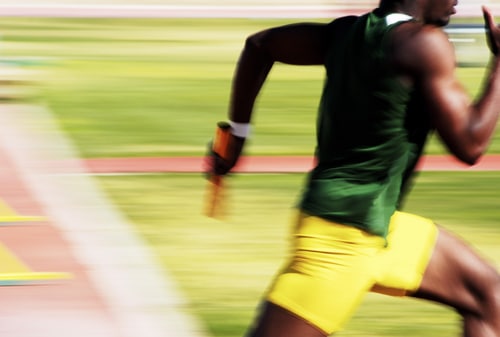 When you exercise, levels of various hormones rise, and some of these hormones play a role in fat-burning and muscle growth. One of these is growth hormone, a hormone produced by the pituitary gland in the brain. The two most potent stimuli that increase the secretion of growth hormone are sleep and exercise. Exactly how and what stimulates growth hormone release during exercise isn’t completely understand, but it plays a role in tissue growth, and, possibly, influences the type of fuel used during exercise.
When you exercise, levels of various hormones rise, and some of these hormones play a role in fat-burning and muscle growth. One of these is growth hormone, a hormone produced by the pituitary gland in the brain. The two most potent stimuli that increase the secretion of growth hormone are sleep and exercise. Exactly how and what stimulates growth hormone release during exercise isn’t completely understand, but it plays a role in tissue growth, and, possibly, influences the type of fuel used during exercise.
Bodybuilders are interested in increasing their growth hormone levels since growth hormone stimulates muscle growth and repair and gives them bigger biceps. Contrary to popular belief, growth hormone doesn’t directly boost muscle growth but increases the size of the connective tissue, which makes the muscle look larger. It also doesn’t increase muscle strength. Another reason athletes and bodybuilders like growth hormone is it increases the rate of fat-burning, so it helps with fat loss.
Growth Hormone Increases with Exercise
The good news is this. When you exercise, levels of this fat-burning hormone that firms your biceps and makes your waistline smaller naturally rise. But moderate-intensity aerobic exercise doesn’t have the same effects that high-intensity exercise does.
Why is high-intensity exercise better? High-intensity exercise leads to the build-up of lactic acid. There’s some thought that lactic acid or the increased blood acidity that goes along with it may boost growth hormone secretion. Resistance exercise also increases growth hormone levels both directly and through another growth factor called IGF-1. A single high-intensity exercise session of 10 minutes or longer can increase growth hormone secretion by up to 300% and keep it elevated for up to 24-hours afterward. A good reason to kick your workout up a notch!
The bad news is training can reduce the amount of growth hormone the body releases during exercise over time. There’s some thought that tissues become more sensitive to growth hormone with training and less of it is needed. Growth hormone release also decreases with age, and this contributes to some of the negative effects of aging such as loss of muscle mass, increased body fat and reduction in energy level.
Can You Increase Growth Hormone Levels Naturally?
Exercise increases growth hormone secretion, particularly resistance training. But to significantly boost growth hormone levels, you need to work out at a high enough intensity to tap into the anaerobic energy system. Interval training where you alternate periods of high-intensity exercise like sprinting alternating with recovery intervals is one way to boost growth hormone levels. Lifting heavy weights, especially compound exercises and exercises that target the larger muscles in the lower extremities will do it too.
The other way to maximize growth hormone levels is to get an adequate amount of sleep. Growth hormone secretion rises in a pulsatile fashion during deep sleep. This may partially explain why people who don’t sleep enough at night are more prone to weight gain.
What about diet? Insulin inhibits the release of growth hormone, so eating high-glycemic carbs that trigger a strong insulin response can reduce growth hormone release and increase fat stores. Eating carbs before bedtime isn’t a good idea since it can blunt the normal release of growth hormone during sleep. Protein foods increase the release of growth hormone.
The Bottom Line?
Growth hormone helps to preserve lean body mass and increase the loss of body fat. Levels decline with age, but high-intensity exercise, adequate sleep and a diet that contains moderate amounts of protein and few high-glycemic carbs will help maximize growth hormone levels – and keep you leaner too.
References:
Sports Medicine. 2003: 33(8): 599-613.
Sports Medicine. 2002: 32(15): 987-1004.
On Fitness. July/August 2011. pages 49-50.
Related Articles By Cathe:
Does Weight Training Boost The Release Of Growth Hormone?
How High-Intensity Exercise Affects Growth Hormone Levels
Growth Hormone and Exercise: What Role Does It Play?
Does the Release of Anabolic Hormones After Heavy Resistance Training Really Boost Muscle Growth?
5 Hormones That Impact Muscle Growth and How They Work
5 Hormones and How They Affect Your Body Composition
What Role Does Growth Hormone Play in Building Lean Body Mass?
Metabolic Aging: How Key Hormones Are Affected by Aging
Hormonal Response to Exercise: How Resistance Exercise and Endurance Training Differ

